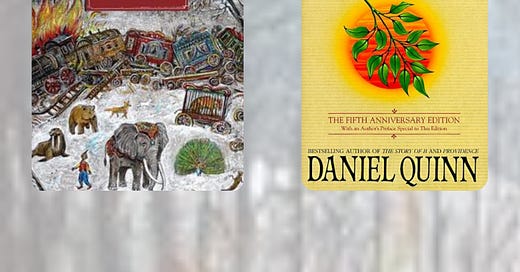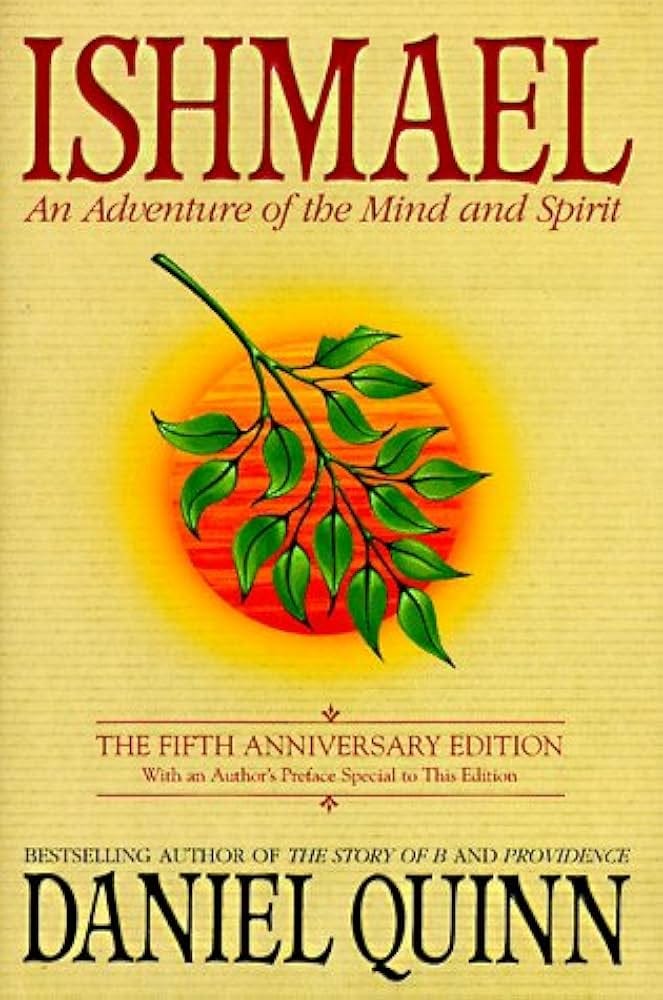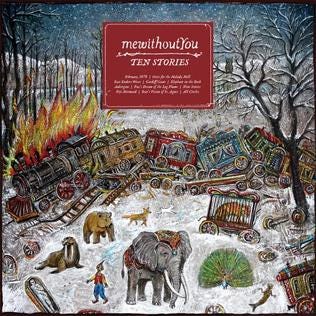Book & Album Pairing: Ishmael by Daniel Quinn and Ten Stories by mewithoutYou
Two philosophical quests with caged animals as your guide
From fables to film, human beings have used animals in fictional stories for centuries to explore morality and ethics. There’s something about personified animals that allows us to understand complex issues in an accessible way.
Today, we’re looking at two works that take the audience on a spiritual and philosophical journey by way of talking animals: Daniel Quinn’s novel Ishmael and mewithoutYou’s album Ten Stories.
Ishmael by Daniel Quinn
A man responds to a newspaper ad submitted by a supposed great teacher who has the key to saving the world for any student willing to study with him. When the man arrives at the address, he discovers the teacher is a talking gorilla in a partitioned enclosure. A wall of glass separates them.
The gorilla is named Ishmael and takes the narrator on a journey of thought to identify the destructive story that the narrator’s people have been enacting for thousands of years. Then, he helps the narrator find a different story.
Most of the book is Socratic dialogue between the narrator and Ishmael. The tension of the story is less in the outward events, which only become relevant near the end of the book, and more on each discovery the narrator makes to name the structures of thought that had been invisible to him. The narrator comes to understand the story of human civilization, colonization, and environmentalism in a new light that no longer places humans above all other creatures. Ironically, as free and evolved as Ismael is in thought, he has no agency over his physical freedom. For the entirety of the novel, he is either in an enclosure or in a sideshow cage to be gawked at.
I imagine that when Ishmael was first published, its ideas likely seemed more hard-hitting and revolutionary. However, I think in 2024, we’re in an era where people are much more aware of the destructive nature of the collective story “civilized” culture has told for generations, because we can easily see the consequences of that story. One of Quinn’s main points in this novel–that humans are not above every other living creature nor exempt from the natural laws that affect them–reminds me of similar points made in Robin Wall Kimmerer’s Braiding Sweetgrass. Though published over a decade after Ishmael, it provides a framework for humanity’s place among the natural world steeped in Potawatomi tradition. From what I understand, Braiding Sweetgrass is a fairly popular book, and in general, I think more people are trying to complete the project of Ishmael–writing a newer, sustainable, and healing story for humans to take part in.
Aspects of Ishmael are certainly dated, but its main purpose is still highly relevant today and its method of employing an animal guide is still an intriguing way to take audiences on this journey. I mean, a talking gorrilla? What’s next, a talking elephant?
Ten Stories by mewithoutYou
We now turn to a concept album released in 2012 about a train crash in the winter of 1878. mewithoutYou’s fifth studio album, Ten Stories, follows a cast of circus animals and sideshow freaks who suddenly find themselves freed from their cage, and reality as they know it, when their train derails during a snowstorm.
The opening track, “February, 1878,” introduces us to most of the characters, including Elephant, who facilitates the train’s derailment once it becomes unstable. Why does the train become unstable? It’s speeding in horrible weather because it’s running late to the next circus. When the train rounds a bend, Elephant slams her body into the bars of the cage, derailing it and allowing the animals to run free–most of them, anyway. Elephant is too old and big to run or hide, so though she has been a mother to the animals during their time in the cage, this is the last caring act she can do for them. After this opening track, each song on the album focuses on a different animal or creature who escaped from the train, and each becomes representative of a different philosophical position.
I won’t pretend like I fully understand this album, even more than a decade after first hearing it. What I can say is that I always get teary when I listening to it front to back while reading the lyrics. In a sense, Ten Stories is an exploration of what happens when our world is expanding, when we’re able to break free from one narrative about reality and enter into another.
To be clear, Ten Stories is by no means an idealistic album. The freedom the animals attain doesn’t necessarily lead to a happier life, but a more enlightened one, and the album ends with what is perhaps the second best album closer in all of mewithoutYou’d discography.
This album is a journey of thought told through personified animals so that even someone who hasn’t studied philosophy can gain something from the ideas explored.
Why they pair together
Like Ishmael, Ten Stories begins with characters in a cage. The circus animals have no agency over their lives and they’re at the mercy of the human masters driving the train faster than it can safely go. Ishmael posits that a dominant segment of human culture has been believing the story that it’s above the laws of nature, hence rapid technological progress at the expense of the environment and human cultures that do not tell that story. The train operators in Ten Stories easily fit into this category. Their story is that these animals are for human entertainment and financial benefit, and they won’t get paid unless they make it to the next town. Elephant knows a way to freedom, and although she doesn’t have nearly as much time as Ishmael to teach, she displays a similar type of freedom to Ishmael in the end. Neither character gets to experience the new narrative they guide their students toward, but they’re at peace.
Looking at the book and the album as companion pieces to one another probably yields some interpretations that neither intend on their own. For example, one of Ishmael’s points is that a population that decides it can take everyone else’s food and infinitely expand its numbers ultimately hastens its own demise. To leave that narrative behind is to also except death, either in a literal sense or in an abstract sense (e.g., death of comfort or certainty). Several characters in Ten Stories come to this realization as well, though the nuances are different.
So, if Ten Stories is your favorite mewithoutYou album, perhaps reading Ishmael will expand your appreciation of it. Likewise, if Ishmael is your favorite novel, maybe Ten Stories can serve as a loosely related soundtrack in your mind. Either way, both works challenge their audience to wrestle with what it means to embark on a new narrative.





